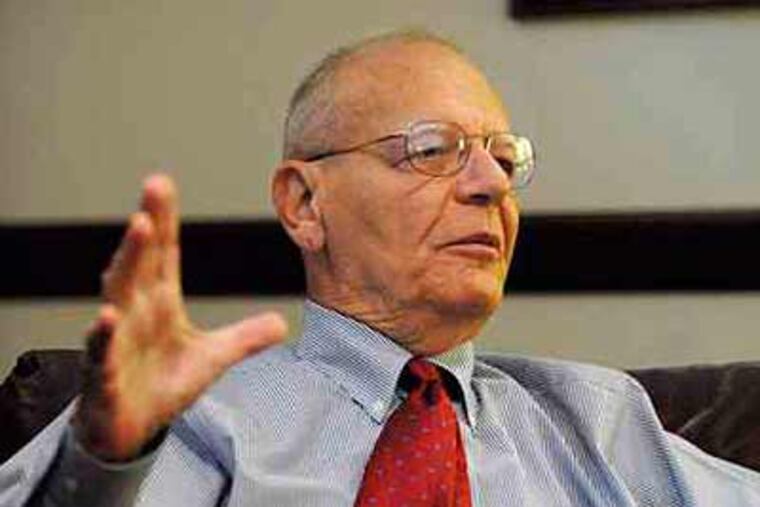PhillyDeals: Pa. congressman: Capitalism trying to destroy itself
"This happens because capitalism keeps trying to destroy itself, by getting out of the bag we put it in to control it." So says Congressman Paul Kanjorski (D., Pa.).

"This happens because capitalism keeps trying to destroy itself, by getting out of the bag we put it in to control it." So says Congressman Paul Kanjorski (D., Pa.).
He was talking about the banking crisis, as stock prices tumbled again yesterday, despite Treasury Secretary Timothy Geithner's effort to rally Americans to the latest bailout, and President Obama's national address the night before.
Last year, Kanjorski, the No. 2 Democrat on the House Banking Committee, had said he was all for pumping up the economy first, and waiting until later to figure out what went wrong.
"We didn't want to panic the population. So they asked us to make these changes and corrections on faith, and we did," Kanjorski told me. "On the auto bill, the stimulus bill, the bailout bill, we were passing solutions without ever having defined to the American people what the problem was."
Now, "people are saying 'whoa.' I don't think there's enough faith to go the full distance. We'll have to stop and get the American people to join in the cause," Kanjorski said.
"We had dinner with the president Thursday night. He is tremendously articulate. But even he was finding it difficult, in talking to members of Congress, to find we were all registering at the same level what he was saying, and that we would understand.
"He had the same problem when he was speaking to the nation. He understands. But he hasn't been able to stop the movie while it's running and make sure everyone in the audience understands the plot, the terminology and where we're going.
"You can't get to the solution of a complicated or difficult situation unless you take the time to define the problem, in relatively simple terms, so people can agree that is the problem."
Kanjorski blames securitization - the dangerous distance between people who borrowed money, and the worldwide investors who financed riskier and riskier loans - under the permissive Clinton and Bush administrations for conjuring the kind of dangerous bank panic that had disappeared after the 1930s.
From there, Kanjorski uses very large numbers:
"If you take all the assets of the world, that's maybe $330 trillion. The U.S. is one-third of that. We've lost $20 trillion in [real estate, stock and bond] value the last five months. We could lose another $20 or $50 trillion, if we pattern on the 1930s Depression.
"To restimulate the economy we're probably looking at costing $6 trillion" in bailouts, make-work projects and loan guarantees.
"Some people say, 'Let the marketplace take care of itself.' But that could mean we go back to living like in the 1850s. We're trying to avoid that $50 trillion loss and stop this whole thing in a year or so.
"Meanwhile, we need to support some people so they don't starve. We need to create some jobs that may not be the most productive, because people have to live."
Kanjorski, of Wilkes-Barre, made news elsewhere yesterday. Politico.com's Ben Smith replayed Kanjorski's doomsday retelling of legislators' Sept. 18, 2008, meeting with Henry Paulson, when, shaken by what they heard, they gave the then-treasury secretary permission to spend $700 billion to bolster the U.S. banking system.
Cherry Hill face-lift
Developer Jeff Hirschfeld, based in West Hartford, Conn., is a downtown kind of builder.
But with plans for the Society Hill hotel he'd like to build (and any number of Manhattan projects) on hold, he's going ahead with a $25 million glass-elevator-cooling- system-clubhouse-kitchen-and- pool replacement project at the former Landmark Apartments, near Rt. 70 in Cherry Hill.
His Hirschfeld Properties L.L.C., backed by lender Eurohypo AG and equity investor Dubai Investment Group, bought the 40-year-old, 40-percent vacant, 544-unit complex last spring, for somewhere north of $70 million.
Prior owners had hoped to turn it into condominiums, but that market has faded, while "the apartment market is still the strongest component in commercial real estate," Hirschfield told me yesterday as he prepared to head down for today's grand reopening.
The nine-month project is a bargain, Hirschfeld said: Today he could never build two new 18-story towers and make a profit, while still charging rents in the $1,000-$2,000 range.